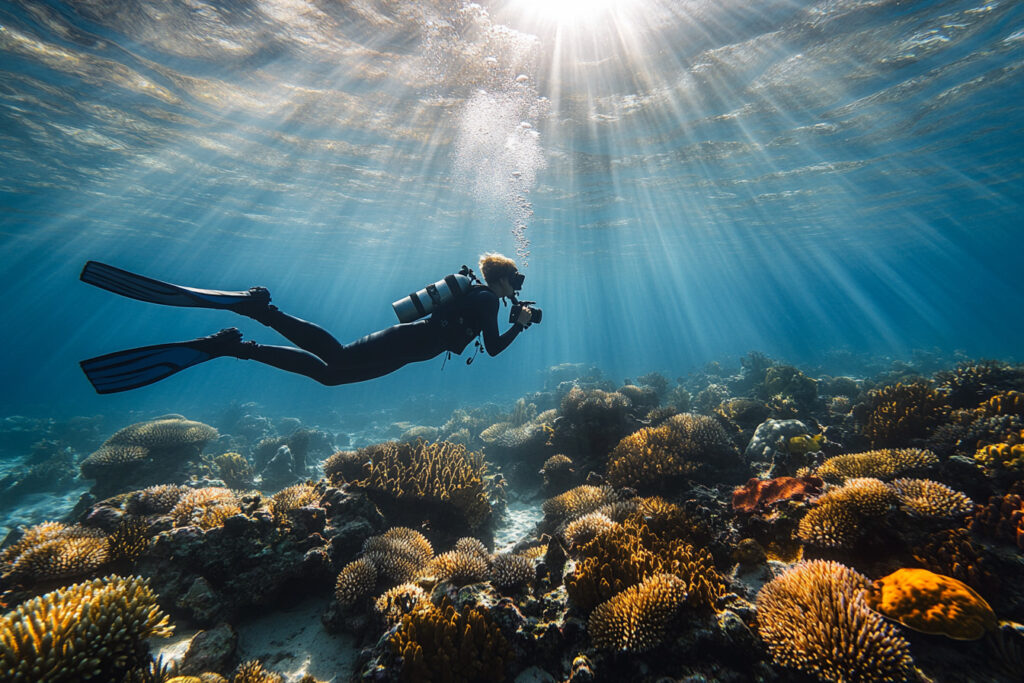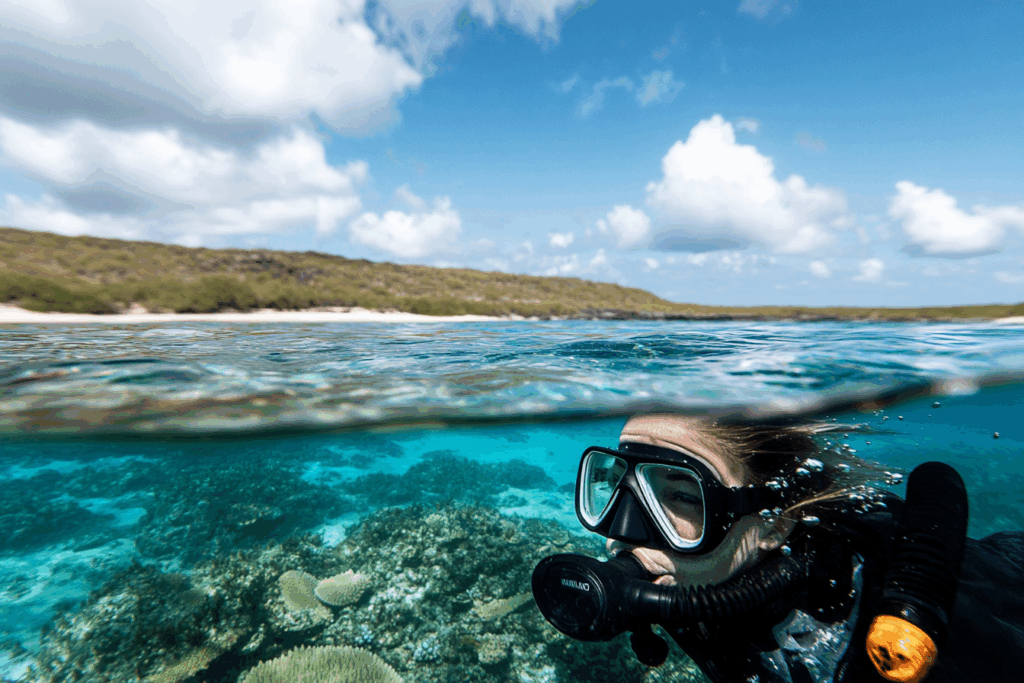Bonaire Citizen Scientist Snorkeling
Have you ever dreamt of a travel experience that goes beyond mere sightseeing – one where your presence contributes directly to the well-being of the very ecosystems you adore?
If your heart beats to the rhythm of the waves, and the vibrant hues of a healthy coral reef stir your soul, then Citizen Scientist Snorkeling in Bonaire is not just a trip; it’s a calling.
Bonaire, a jewel of the Caribbean Netherlands, is renowned globally as a diver’s and snorkeler’s paradise. But its magic extends far beyond its crystal-clear waters and abundant marine life. This island is a living laboratory, a testament to decades of dedicated marine conservation and a beacon for those who wish to merge leisure with genuine impact.
At Chromatic Safari, we believe that every ripple you create can contribute to a stronger, healthier ocean. This ultimate guide will equip you to plan an unforgettable adventure in Bonaire that not only thrills your senses but also empowers you to become an active guardian of its precious underwater world.

Why Bonaire is a Paradise for Conscious Travelers
Bonaire’s commitment to marine preservation is legendary. As the first Caribbean island to establish a fully protected marine park – the Bonaire National Marine Park (BNMP) – it set a global standard. Since 1979, all waters from the high-water mark down to 60 meters (200 feet) are protected, ensuring the health and vibrancy of its extensive coral reef system. This forward-thinking approach has resulted in unparalleled visibility, thriving coral formations, and an incredible diversity of fish species, making it an ideal location for both leisurely exploration and serious eco-travel.
But Bonaire isn’t just about protection; it’s about active participation. The island fosters a strong community of marine biologists, conservationists, and tourism operators who openly welcome visitors to get involved. This symbiotic relationship sets the stage for a unique kind of tourism: citizen science tourism.
Planning Your Sustainable Citizen Scientist Snorkeling Trip
Embarking on a citizen scientist snorkeling adventure in Bonaire requires a blend of preparation and an open heart. Here’s how to ensure your trip is both impactful and unforgettable.
Best Time to Visit for Optimal Snorkeling & Citizen Science
Bonaire enjoys a near-perfect climate year-round, with average temperatures around 27°C (81°F) and consistent trade winds that keep things comfortable. The water temperature hovers between 26-29°C (79-84°F), making it ideal for snorkeling any time.
- Dry Season (April – October): Generally considered the peak season with less rainfall and calm seas. This is fantastic for excellent visibility.
- Wet Season (November – March): While there might be occasional short showers, these usually don’t deter ocean activities. This period can sometimes offer slightly cooler temperatures and fewer crowds.
For Citizen Science: Specific marine conservation projects or coral monitoring programs might have scheduled dates or peak seasons for data collection. For instance, Reef Renewal Foundation Bonaire (RRFB) conducts regular out-planting activities, and citizen scientist opportunities might align with these. It’s always best to check directly with the organizations you wish to engage with for their specific calendars.
Finding True Eco-Lodges and Sustainable Accommodations
Choosing where you rest your head is just as important as where you dip your fins. Bonaire has a growing number of accommodations committed to sustainability. Look for lodges that demonstrate a genuine effort in:
- Certifications: Seek out places with recognized environmental certifications like Green Globe or Travelife. While not all eco-lodges are certified, these provide a strong indication of commitment.
- Water Conservation: Bonaire is a desert island, so water is incredibly precious. Look for hotels that promote towel and linen reuse, use water-efficient fixtures, and perhaps even desalinate their own water responsibly.
- Energy Efficiency: Hotels committed to solar power, energy-efficient lighting, and mindful AC usage are making a difference.
- Waste Reduction: Ask about their recycling programs, efforts to reduce single-use plastics, and composting initiatives.
- Community Support: Does the accommodation employ locals, source food locally, and contribute to the local economy beyond just paying taxes?
- Lionfish Containment Efforts: Some accommodations, like resorts with dive shops, actively participate in lionfish removal programs.
Pro Tip: Look for accommodations that offer dedicated rinse tanks for snorkeling/diving gear, usually with signs encouraging water conservation. [Link to: How to Choose an Eco-Friendly Hotel article]
Ethical Wildlife & Ocean Tours: Engaging in Citizen Science

This is where your citizen scientist journey truly begins! Bonaire offers unparalleled opportunities to contribute directly to marine research and conservation through guided tours. This is vastly different from passive observation; you become an active participant.
What Makes a Tour Ethical and Citizen Scientist-Friendly?
- Focus on Education & Non-Intervention: Ethical tours prioritize educating participants about marine life and proper interaction (no touching, chasing, or feeding). Citizen science tours go further, teaching you how to collect data.
- Small Group Sizes: Smaller groups minimize disturbance to marine life and allow for more personalized instruction.
- Experienced Guides: Guides should be knowledgeable not just about marine biology but also about the specific citizen science protocols you’ll be following.
- Partnerships with Research Organizations: True citizen science tours will be affiliated with or directly run by reputable scientific organizations or NGOs. They will clearly outline how your data will be used.
- No Touching Policy: Absolutely no touching of coral, fish, or other marine creatures. Even seemingly benign touches can damage delicate organisms.
- Reef-Safe Practices: Guides should enforce the use of reef-safe sunscreen and proper buoyancy control to avoid damaging the reef.
Citizen Scientist Opportunities in Bonaire:
- Coral Reef Monitoring Programs: Many dive shops and non-profits offer guided snorkeling tours where you learn to identify coral species, assess coral health, or even participate in coral restoration efforts. Organizations like Reef Renewal Foundation Bonaire (RRFB) are at the forefront of this, actively growing and out-planting coral fragments. Inquire if they have specific citizen scientist snorkeling opportunities for data collection or monitoring.
- Fish ID Surveys: Learn to identify various fish species and contribute data to ongoing population studies. This is often done in conjunction with organizations like the Reef Environmental Education Foundation (REEF), which has established protocols frequently used by local operators.
- Invasive Lionfish Removal: While typically done by divers with specialized equipment, some organizations might offer educational snorkeling components where you learn about the lionfish problem and how efforts are organized. [Link to: How to Choose an Ethical Dive Operator article]
- Seagrass Bed Monitoring: Often overlooked, seagrass beds are vital nurseries. Some citizen science programs focus on surveying the health and inhabitants of these crucial ecosystems.
How to Find These Tours:
- Directly Contact Marine Conservation NGOs: Reach out to organizations like Bonaire National Marine Park, STINAPA Bonaire (the managing body of BNMP), or Reef Renewal Foundation Bonaire. They often have volunteer programs or can direct you to operators running official citizen science projects.
- Reputable Dive Shops: Many dive centers in Bonaire are deeply involved in conservation. Inquire specifically about “citizen science snorkeling courses” or “ecology snorkeling trips.” Look for those with marine biologists on staff.
- Check Local Tourist Boards: The Tourism Corporation Bonaire website might list providers focused on eco-tourism.
Packing for a Plastic-Free & Reef-Safe Trip
Your packing choices can significantly reduce your environmental footprint. Embrace the “leave no trace” philosophy even before you arrive.
- Reusable Water Bottle: Bonaire has excellent potable tap water. Carry a reusable bottle and refill it frequently. Say goodbye to single-use plastic bottles!
- Reusable Shopping Bag: For any souvenirs or groceries.
- Reef-Safe Sunscreen: This is non-negotiable in Bonaire. Choose sunscreens that are free of oxybenzone and octinoxate, chemicals known to harm coral reefs. Many shops in Bonaire sell it, but it’s best to bring your own. [Link to: Best Reef-Safe Sunscreens article]
- Lightweight, Quick-Dry Clothing: Reduces laundry needs.
- Reusable Utensils & Straw: If you anticipate eating out, these can help you avoid plastic cutlery.
- GoPro/Underwater Camera: If you plan to take photos, ensure you fully understand proper underwater etiquette to avoid disturbing marine life or kicking up sediment.
- Personal Snorkel Gear: While rental gear is available, bringing your own ensures comfort and hygiene. It also means less reliance on disposable parts or excessive cleaning chemicals at rental shops.
- Biodegradable Toiletries: Opt for shampoo bars, solid soaps, and toothpastes in eco-friendly packaging.
Local Conservation Projects You Can Support
Beyond participating in specific tours, there are many ways to support Bonaire’s conservation efforts:
- Pay Your Marine Park Tag: Every diver and snorkeler is required to purchase a Stinapa Marine Park Tag. This fee directly funds the management and protection of the Bonaire National Marine Park. It’s a small fee with a huge impact.
- Donate to Local NGOs:
- STINAPA Bonaire: The leading organization managing Bonaire’s protected areas, including the marine park.
- Reef Renewal Foundation Bonaire (RRFB): Dedicated to restoring Bonaire’s coral reefs through active propagation and out-planting. They run a fantastic program.
- Sea Turtle Conservation Bonaire (STCB): Working to protect Bonaire’s sea turtle populations.
- Support Local Businesses Committed to Sustainability: Choose restaurants that source locally, shops that sell sustainably made products, and tour operators with strong environmental policies.
- Report Concerns: If you witness any activity that seems harmful to the marine environment (e.g., coral damage, pollution, illegal fishing), report it to STINAPA or your tour operator.
Your Impact, Our Ocean
So, pack your eco-friendly fins, prepare your data sheets, and get ready to witness the unparalleled beauty of Bonaire’s reefs – and know that with every breath you take, and every observation you make, you’re helping to ensure their vibrancy for generations to come.
What are your favorite sustainable travel tips for Bonaire? Have you participated in citizen science projects there? Share your experiences and insights in the comments below! Let’s inspire each other to travel with purpose and protect the irreplaceable beauty of our blue planet.

You must be logged in to post a comment.